
 Paycheck most certainly was just that for star Ben Affleck, because he invests very little in the film, other than portraying an unlikable chucklehead, which his protagonist is not supposed to be. Like Minority Report (but with lower star wattage and much less behind-the-camera skill), Paycheck is based on a Philip K. Dick short story. Affleck plays some kind of freelance techno-whiz who consults on jobs so top-secret that after his gig is over, his memory of the experience is erased. As the story begins, he accepts a two-year assignment — one far longer than ever before — that will result in an eight-figure payday, meaning he won’t have to work ever again.
Paycheck most certainly was just that for star Ben Affleck, because he invests very little in the film, other than portraying an unlikable chucklehead, which his protagonist is not supposed to be. Like Minority Report (but with lower star wattage and much less behind-the-camera skill), Paycheck is based on a Philip K. Dick short story. Affleck plays some kind of freelance techno-whiz who consults on jobs so top-secret that after his gig is over, his memory of the experience is erased. As the story begins, he accepts a two-year assignment — one far longer than ever before — that will result in an eight-figure payday, meaning he won’t have to work ever again.
But when he’s done and his brain is wiped clean of the previous 24 months, he is shocked to find that he has forfeited his money in exchange for an envelope full of 20 items worthy of a junk drawer: a paper clip, a pass key, Affleck’s career. He’s also pursued by the police, for a murder he’s not sure he did or didn’t commit, and as he flees, he learns that each item in the envelope helps him evade capture. Perhaps he was working on a machine that could foresee … the future?!?
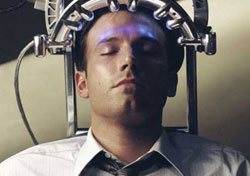 It’s not a terrible idea for a film, but director John Woo and company have steered it down that road. Woo’s Asian sensibilities simply do not translate well to American film; his direction is needlessly showy, making for choppy editing, awkward pacing and poor performances. Plus, when he manages — even in a sci-fi thriller — to throw a shot of his beloved white doves, I had to groan.
It’s not a terrible idea for a film, but director John Woo and company have steered it down that road. Woo’s Asian sensibilities simply do not translate well to American film; his direction is needlessly showy, making for choppy editing, awkward pacing and poor performances. Plus, when he manages — even in a sci-fi thriller — to throw a shot of his beloved white doves, I had to groan.
Affleck has shown signs of being able to act before, but here he’s simply coasting; the man can’t even laugh credibly. As a biologist and requisite love interest, Uma Thurman is completely vacant, giggling and trying to act like she’s Kate Hudson or something. She’s not and it doesn’t matter, anyway, because she and Affleck have zero chemistry. Oh, and I’m not certain, but I think Paul Giamatti is supposed to be playing a monkey. —Rod Lott

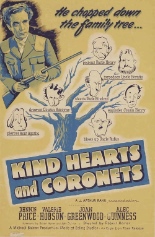
 A condemned nobleman sits in his jail cell, mere hours away from his appointment with a noose. The epitome of good grace, he’s seems to have accepted his fate as calmly as any man could, although he is innocent of the murder for which he has been convicted. With so little time left, he has to hurry if he is to properly jot down the tale of his rise to the nobility and all of the people he really did kill before finding himself in this somewhat ironic predicament.
A condemned nobleman sits in his jail cell, mere hours away from his appointment with a noose. The epitome of good grace, he’s seems to have accepted his fate as calmly as any man could, although he is innocent of the murder for which he has been convicted. With so little time left, he has to hurry if he is to properly jot down the tale of his rise to the nobility and all of the people he really did kill before finding himself in this somewhat ironic predicament.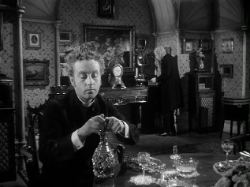 As played by Dennis Price, Louis Mazzini is so upfront and charming about his crimes and his reasons for committing them that it’s only in retrospect you realize there might be something wrong with him. It’s easy to imagine yourself in his place, doing exactly the same thing. The only reason he isn’t considered one of the greatest villains in film history is because writer/director Robert Hamer so expertly presents him as its hero, it’s impossible to think of him as anything else.
As played by Dennis Price, Louis Mazzini is so upfront and charming about his crimes and his reasons for committing them that it’s only in retrospect you realize there might be something wrong with him. It’s easy to imagine yourself in his place, doing exactly the same thing. The only reason he isn’t considered one of the greatest villains in film history is because writer/director Robert Hamer so expertly presents him as its hero, it’s impossible to think of him as anything else.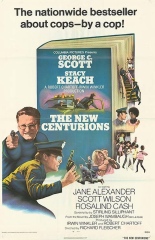
 No one writes a cop novel like Joseph Wambaugh, so it’s no wonder Hollywood has adapted so many of them, starting with
No one writes a cop novel like Joseph Wambaugh, so it’s no wonder Hollywood has adapted so many of them, starting with 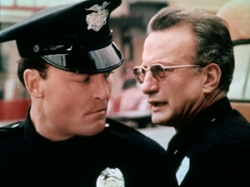 There’s a reason they call it a beat: because it wears one down. Like Wambaugh’s excellent, reality-based novels, Richard Fleischer’s film pulls back the veil of being an officer, presenting a portrait that’s not at all gussied-up, revealing the repercussions of making an honest but deadly mistake, and the toll the job takes at home. A scene in which the wrong guy is fatally shot is powerful, but most tense is when the police attempt to wrest an abused newborn from its drunk mother.
There’s a reason they call it a beat: because it wears one down. Like Wambaugh’s excellent, reality-based novels, Richard Fleischer’s film pulls back the veil of being an officer, presenting a portrait that’s not at all gussied-up, revealing the repercussions of making an honest but deadly mistake, and the toll the job takes at home. A scene in which the wrong guy is fatally shot is powerful, but most tense is when the police attempt to wrest an abused newborn from its drunk mother. 
 Okay, I admit it: I’m not perfect. I’ve done some pretty lousy things in my life. But I have never done anything, wanted to do anything, or even thought of anything to make me deserve this movie. If Stalin were in Hell watching
Okay, I admit it: I’m not perfect. I’ve done some pretty lousy things in my life. But I have never done anything, wanted to do anything, or even thought of anything to make me deserve this movie. If Stalin were in Hell watching 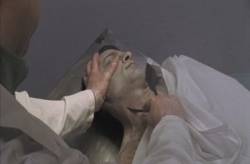 So on this night of nights, Margo is interrupted by a family of three that comes in because they ran out of gas. (Mom is played by Heather Donahue, she of the enraged nostrils in
So on this night of nights, Margo is interrupted by a family of three that comes in because they ran out of gas. (Mom is played by Heather Donahue, she of the enraged nostrils in 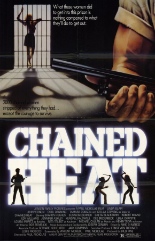
 Already convinced by previous viewings that
Already convinced by previous viewings that 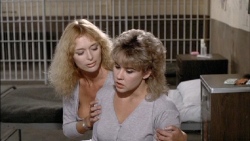 And Chained Heat? It tells the story of the misery and corruption found in a women’s prison that focuses on characters like Carol Henderson (Linda Blair), an otherwise law-abiding everywoman who ran over and killed a man by accident; Ericka (Sybil Danning), a cruel, dangerous Aryan who sets her sights on Carol’s ass and tries to make it her own; and Duchess (Tamera Dobson), the Vassar-educated queen bee of the prison’s (frequently mentioned, but largely unseen) black prison population.
And Chained Heat? It tells the story of the misery and corruption found in a women’s prison that focuses on characters like Carol Henderson (Linda Blair), an otherwise law-abiding everywoman who ran over and killed a man by accident; Ericka (Sybil Danning), a cruel, dangerous Aryan who sets her sights on Carol’s ass and tries to make it her own; and Duchess (Tamera Dobson), the Vassar-educated queen bee of the prison’s (frequently mentioned, but largely unseen) black prison population.